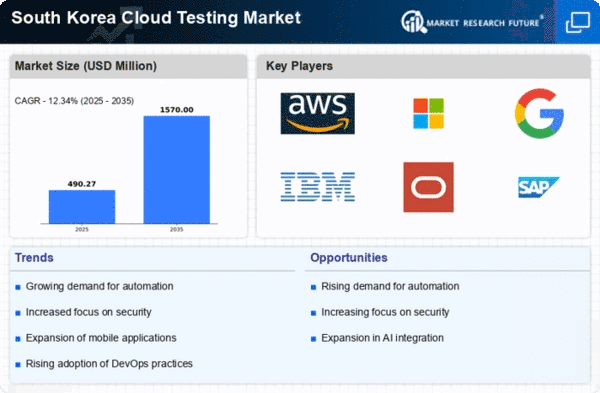Expansion of Mobile Applications
The proliferation of mobile applications in South Korea is significantly influencing the cloud testing market. With a substantial portion of the population relying on mobile devices for various services, businesses are compelled to ensure their applications function flawlessly across diverse platforms. This has led to an increased focus on cloud testing solutions that can simulate real-world conditions and user interactions. The market for mobile application testing is expected to reach $1 billion by 2026, indicating a robust demand for cloud-based testing services. Consequently, the cloud testing market is poised to benefit from this trend as organizations seek to deliver high-quality mobile experiences.
Growing Emphasis on Cost Efficiency
Cost efficiency remains a critical driver for the cloud testing market in South Korea. Organizations are increasingly seeking ways to optimize their testing processes while minimizing expenses. Cloud testing solutions offer a compelling advantage by reducing the need for extensive on-premises infrastructure and associated maintenance costs. By leveraging cloud resources, companies can scale their testing efforts according to demand, leading to potential savings of up to 30% in operational costs. This financial incentive is likely to propel the adoption of cloud testing services, as businesses aim to enhance their testing capabilities without straining their budgets.
Rising Demand for Agile Development
The cloud testing market in South Korea is experiencing a notable surge in demand for agile development methodologies. As organizations strive to enhance their software delivery speed, the need for efficient testing solutions becomes paramount. Agile practices necessitate continuous testing, which aligns seamlessly with cloud-based testing environments. This shift is reflected in the increasing investment in cloud testing tools, with the market projected to grow at a CAGR of approximately 15% over the next five years. Companies are recognizing that cloud testing not only accelerates the development cycle but also improves collaboration among teams, thereby driving the overall growth of the cloud testing market.
Advancements in Artificial Intelligence
The integration of artificial intelligence (AI) technologies into the market is emerging as a transformative driver. AI-powered testing tools can enhance the efficiency and accuracy of testing processes by automating repetitive tasks and providing predictive analytics. In South Korea, where technological innovation is a priority, the adoption of AI in cloud testing is likely to accelerate. This trend could lead to a market expansion of approximately 20% over the next few years, as organizations seek to leverage AI capabilities to improve their testing outcomes. The potential for AI to streamline testing workflows positions it as a key factor in the evolution of the cloud testing market.
Increased Regulatory Compliance Requirements
The market is also being shaped by the rising regulatory compliance requirements in South Korea. As industries such as finance and healthcare face stringent regulations, the need for robust testing solutions becomes critical. Organizations are compelled to ensure that their software adheres to compliance standards, which necessitates comprehensive testing strategies. This trend is driving the demand for cloud testing services that can provide thorough documentation and traceability. The market is expected to see a growth rate of around 12% as companies invest in cloud testing solutions to meet these regulatory demands and mitigate risks associated with non-compliance.
















